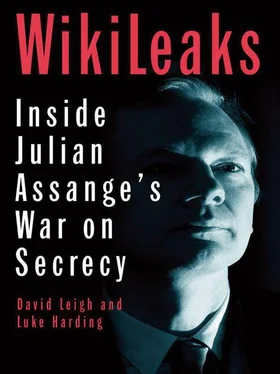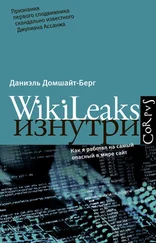Harding, Luke - WikiLeaks - Inside Julian Assange's War on Secrecy
Здесь есть возможность читать онлайн «Harding, Luke - WikiLeaks - Inside Julian Assange's War on Secrecy» весь текст электронной книги совершенно бесплатно (целиком полную версию без сокращений). В некоторых случаях можно слушать аудио, скачать через торрент в формате fb2 и присутствует краткое содержание. Жанр: Старинная литература, на английском языке. Описание произведения, (предисловие) а так же отзывы посетителей доступны на портале библиотеки ЛибКат.
- Название:WikiLeaks: Inside Julian Assange's War on Secrecy
- Автор:
- Жанр:
- Год:неизвестен
- ISBN:нет данных
- Рейтинг книги:3 / 5. Голосов: 1
-
Избранное:Добавить в избранное
- Отзывы:
-
Ваша оценка:
- 60
- 1
- 2
- 3
- 4
- 5
WikiLeaks: Inside Julian Assange's War on Secrecy: краткое содержание, описание и аннотация
Предлагаем к чтению аннотацию, описание, краткое содержание или предисловие (зависит от того, что написал сам автор книги «WikiLeaks: Inside Julian Assange's War on Secrecy»). Если вы не нашли необходимую информацию о книге — напишите в комментариях, мы постараемся отыскать её.
WikiLeaks: Inside Julian Assange's War on Secrecy — читать онлайн бесплатно полную книгу (весь текст) целиком
Ниже представлен текст книги, разбитый по страницам. Система сохранения места последней прочитанной страницы, позволяет с удобством читать онлайн бесплатно книгу «WikiLeaks: Inside Julian Assange's War on Secrecy», без необходимости каждый раз заново искать на чём Вы остановились. Поставьте закладку, и сможете в любой момент перейти на страницу, на которой закончили чтение.
Интервал:
Закладка:
He spent several days there, sleeping in the day and working on his laptop through the night. Then he moved to a nearby hotel, spent the World Cup final weekend at Nick Davies’ Sussex home (but, says Davies, “He wasn’t the slightest bit interested in football”) and settled for a while at the Pimlico townhouse of Gavin MacFadyen, the City University professor and journalist. Assange brought with him only three pairs of socks. But he swiftly charmed the MacFadyen household, borrowed poetry books from the shelves, and patiently explained the Big Bang, complete with mathematical formulae, to some wide-eyed visiting children. The only uncomfortable moment came over a meal of risotto, cooked by Sarah Saunders, a gourmet caterer and the daughter of MacFadyen’s wife, Susan. Typically, Assange would tap at his laptop throughout meals; other WikiLeaks volunteers who came and went did the same thing. On this occasion Saunders told him to turn his laptop off. Assange, to his credit, instantly complied.
A month later, he was provided with a bigger base for his growing organisation at the journalists’ Frontline Club in west London. Something about the wandering Assange made a succession of people he encountered want to look after him and protect him – even if that sentiment was not always enduring.
The team flowing in and out of the Guardian war room was also growing in size. The Guardian ’s two distinguished veterans of the Iraq conflict, Jonathan Steele and James Meek, were co-opted. The executive editor of the New York Times , Bill Keller, sent over Eric Schmitt, his highly experienced war correspondent. Schmitt, whose knowledge of the military background was helpful, was able to report back that the war logs seemed authentic. He put them on a memory stick and flew home to start the process of building a database in New York.
The German contingent, too, were able to make a crucial contribution to the verification process. As the broker of the original deal with the Guardian and the New York Times , Nick Davies had not at first been entirely pleased with the arrival of Der Spiegel – a prospect that had only been tentatively mentioned at the Brussels meeting by his colleague Ian Traynor. Assange told him that lunch with Der Spiegel was taking place in Berlin. Then, in a phone call from a man calling himself Daniel Schmitt – actually Assange’s then No 2, Daniel Domscheit-Berg – he was told not only Der Spiegel but also a German radio station would be full “media partners” on the war logs. “I felt very confused. My first instinct was to say no,” Davies recalled. “A deal is a deal. Security is very important. I felt: ‘You can’t come in.’” Davies eventually agreed that while German radio was out, Der Spiegel could be in. Their reporters John Goetz and Marcel Rosenbach flew over to the war room.
“They fitted in very well. We liked them as people. They had lots of background expertise on Afghanistan,” Davies says. Crucially, Der Spiegel sources had access to the German federal parliament’s own investigation into the war in Afghanistan, including secret US military material. This proved vital in confirming that the details in the database the Guardian had been given were authentic.
The papers had another headache. Normally, with a story of this magnitude, the practical thing to do was to run it over several days. This maintained reader interest and helped sell more copies. In a previous campaign, on corporate tax avoidance, the Guardian had run a story a day non-stop for two weeks. This time, such a strategy was going to be impossible. For one thing, the two dailies in London and New York were now yoked to a weekly magazine in Germany. With only one shot at it, Der Spiegel would want to get all its stories out on Day One.
Secondly, and more gravely, none of the editors knew whether they would be allowed a Day Two at all. The US government’s response might be so explosive that they sent their lawyers in with a gag order. So it was decided that, in the Guardian ’s case, the paper would run everything they had over 14 pages, on the day of launch. There was, of course, a downside to the approach: although the launch of the Afghan war logs was to cause an immense uproar, it was difficult to find anyone in London the next day who had actually ploughed through all 14 pages. It was simply too much to read. For the Iraq logs, by which time it was clear the US government was not going to seek court injunctions and gag orders against the media, publication was to be more comfortably spread over a few days.
The knottiest problem surrounded redactions. The papers planned only to publish a relatively small number of significant stories, and with them the text of the handful of relevant logs. WikiLeaks, on the other hand, intended simultaneously to unleash the lot. But many of the entries, particularly the “threat reports” derived from intelligence, mentioned the names of informants or those who had collaborated with US troops. In the vicious internecine politics of Afghanistan, such people could be in danger. Declan Walsh was among the first to realise this:
“I told David Leigh I was worried about the repercussions of publishing these names, who could easily be killed by the Taliban or other militant groups if identified. David agreed it was a concern and said he’d raised the issue with Julian, but he didn’t seem concerned. That night, we went out to a Moorish restaurant, Moro, with the two German reporters. David broached the problem again with Julian. The response floored me. ‘Well, they’re informants,’ he said. ‘So, if they get killed, they’ve got it coming to them. They deserve it.’ There was, for a moment, silence around the table. I think everyone was struck by what a callous thing that was to say.
“I thought about the American bases I’d visited, the Afghan characters I’d met in little villages and towns, the complex local politics that coloured everything, and the dilemmas faced by individuals during a bloody war. There was no way I’d like to put them at risk on the basis of a document prepared by some wet-behind-the-ears American GI, who may or may not have correctly understood the information they were receiving. The other thing that little exchange suggested to me was just how naive – or arrogant – Julian was when it came to the media. Apart from any moral considerations, he didn’t seem to appreciate how the issue of naming informants was likely to rebound on the entire project.”
Davies, too, was dismayed by the difficulty of persuading Assange to make redactions. “At first, he simply didn’t get it, that it’s not OK to publish stuff that will get people killed,” Davies said. The Guardian reporter had been studying Task Force 373, a shadowy special operations group whose job was to capture or kill high-ranking Taliban. One war log was especially troubling: it described how an unnamed informant had a close relative who lived an exact distance south-east of the named target’s house and “will have eyes on target”. Clearly it was possible to work out these identities with the help of some local knowledge, and to publish the log might lead to the Taliban executing both Afghans. But Assange, according to Davies, was unbothered. For all his personal liking of the WikiLeaks founder, says Davies: “The problem is he’s basically a computer hacker. He comes from a simplistic ideology, or at that stage he did, that all information has to be published, that all information is good.”
In fairness to Assange, he eventually revisited his view, despite the technical difficulties it posed for WikiLeaks. And by the time the US state department cables were published, five months later, Assange had entirely embraced the logic of redaction, with his role almost that of a mainstream publisher. Short of time before the Afghan launch, he removed wholesale the 15,000 intelligence files, listed as “threat reports”, which were most likely to contain identifying details. This left some identities still discoverable in the main body of the cables, a fact which Rupert Murdoch’s London Times published prominently. Despite their supposed disapproval of WikiLeaks, the paper had pointed to information that could have helped the Taliban to murder people. By the time the Iraq logs were launched, Assange had time to construct a more sophisticated editing programme, which redacted a vast number of names. And when it came to publishing the diplomatic cables, on the face of it at least, Assange had abandoned his original ambition to dump out everything. He contented himself during the course of 2010 with only publishing a small fraction of the cables – those whose text had already been individually redacted by journalists from the five print media partners.
Читать дальшеИнтервал:
Закладка:
Похожие книги на «WikiLeaks: Inside Julian Assange's War on Secrecy»
Представляем Вашему вниманию похожие книги на «WikiLeaks: Inside Julian Assange's War on Secrecy» списком для выбора. Мы отобрали схожую по названию и смыслу литературу в надежде предоставить читателям больше вариантов отыскать новые, интересные, ещё непрочитанные произведения.
Обсуждение, отзывы о книге «WikiLeaks: Inside Julian Assange's War on Secrecy» и просто собственные мнения читателей. Оставьте ваши комментарии, напишите, что Вы думаете о произведении, его смысле или главных героях. Укажите что конкретно понравилось, а что нет, и почему Вы так считаете.












